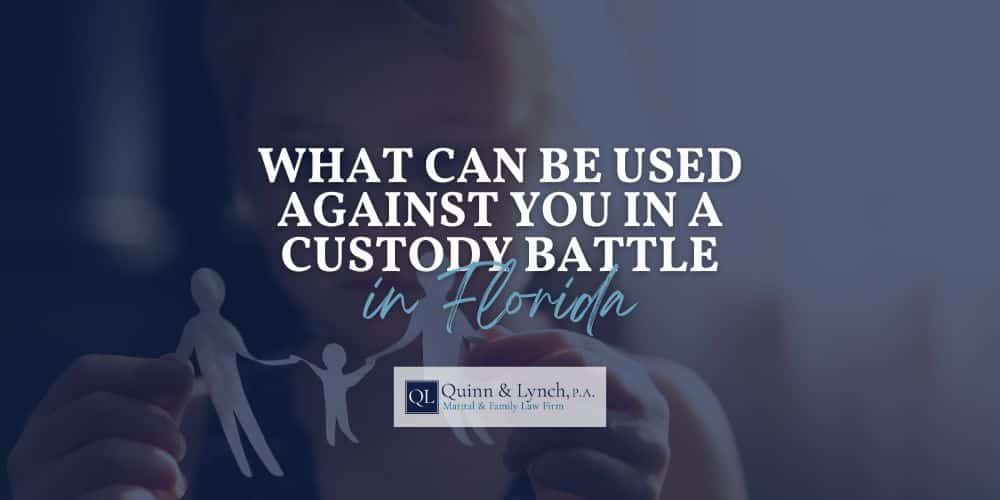There are many different factors that can significantly impact the outcome of a Florida child custody battle. So, for those involved in child custody cases, it’s critical to understand what can be used against you in a custody battle in Florida.
In contentious divorces, parents can lose sight of the fact that they don’t just “deal with the other parent” until the divorce is finalized. Some parents simply want to “win” child custody, but does the child win in that situation? It’s important for parents to prioritize the best interest of the child, not what’s best for their personal situation. Judges are adept at determining which parents truly prioritize their child’s well-being.
If you are unsure about your chances of being granted custody, you need a Tampa child custody attorney to help ensure the outcome of your case reflects the best interest of your child’s welfare.
At Quinn & Lynch, our family law attorneys are experienced in the Florida court system and have in-depth knowledge of local child custody laws. We’re here to provide you with guidance under Florida’s child custody laws and support throughout the legal process.
Call 813-223-7739 to schedule a consultation with a child custody lawyer at Quinn & Lynch, P.A.
How is Custody Determined in Florida?
In Florida, custody decisions are primarily guided by the best interests of the child. The judge presiding over the child custody case will carefully consider a variety of factors in order to develop a custody arrangement that is aligned with Florida custody laws, and that is best for the child’s welfare.
For more in-depth information on how custody is determined in Florida or what can be used against you in a Florida divorce, contact a Tampa visitation attorney at Quinn & Lynch, P.A.
What Can Be Used Against You in a Florida Child Custody Battle?
So, what can be used against you in a custody battle? Below are some of the biggest factors that Florida divorce courts consider in child custody decisions, all of which could affect your parenting time in a child custody battle.
Domestic Violence and Child Abuse
Domestic violence and child abuse rank highest on the list of what can be used against you in a custody battle in Florida. The court prioritizes the child’s safety and well-being above all else and will protect children from their own family members in order to ensure the child has a safe and stable environment.
A previous history of physical altercations or child endangerment can affect whether or not a parent is granted custody of their child. Additionally, new evidence of abuse, such as domestic violence injunctions, police reports, the child’s medical records, or testimony from witnesses, can affect decisions in child custody battles.
Physically abusive parents often have their custody or visitation rights heavily restricted or denied altogether. A Tampa domestic violence divorce lawyer can help you better understand how any form of child endangerment may affect your custody dispute.
Alcohol Abuse and Drug Abuse
Evidence of drug or alcohol abuse can also be detrimental in a Florida child custody battle. Courts strive to protect the mental and physical health of children in child custody battles, and abuse causing emotional distress of any form can reflect poorly on the parent, raising concerns about a parent’s ability to provide a safe and stable environment and form a good parent-child relationship.
If your ex-spouse documents substance abuse issues, such as DUI arrests or rehabilitation or medical records, such behavior may be used against a parent in a child custody dispute.
Missing Child Support Payments
Paying child support is part of being a responsible parent under Florida’s child custody laws. Consistently missing child support payments can impact your custody case in Florida and could cause the court to change your existing child custody agreement. Parents who are ordered to pay child support are expected to pay child support to ensure their child has a stable environment, so not paying child support is seen as neglecting their child’s well-being.
When parents consider “what can be used against you in a custody battle,” this rarely crosses the mind of the parent ordered to pay child support.
Consistently missing child support payments and violating court orders not only damages the co-parent relationship but a former spouse can use this against you in your child custody case. We address additional penalties here: how far behind in child support is before a warrant is issued in Florida.
Child support arrears in Tampa may suggest to the court that a parent isn’t acting as a responsible parent should, and more parenting time may not be in the best interest of the child. Failure to pay child support can also lead to Tampa child support enforcement actions like wage garnishment, liens, license suspensions, imputed income in Florida and in some cases a Florida writ of bodily attachment.

Criticizing the Other Parent in Front of the Child
Another factor that can harm your custody case is speaking negatively about the other parent or the other parent’s new partner in front of the child. Florida divorce courts understand that a positive co-parent relationship is in the best interest of the child.
A custody evaluator may consider constant criticism of the other parent or their new partner as detrimental to the child’s emotional well-being and could suggest an inability to support healthy co-parenting that benefits the child’s adjustment after a divorce. Such behavior can influence visitation rights in custody disputes.
Parental Alienation
Parental alienation, occurring when a parent attempts to turn a child against the other parent, especially at an early age, is strongly frowned upon in Florida child custody battles. Many parents want their ex-spouse completely out of their lives and will use this tactic to try and remove their former spouse from their child’s life, as well.
A custody evaluator will consider this behavior to be manipulative and harmful to the child’s emotional well-being. Such behavior can be used against parents in custody proceedings.
Violating Court Orders
Violating legal custody orders is one of the few reasons a judge will change custody orders and could even lead to other legal consequences.
Consistently disregarding court orders demonstrates a lack of respect for legal authority and can significantly undermine your credibility in a Florida custody battle. Parents are required to follow custody arrangements to ensure stability and predictability for the child.
Showing up to Court Proceedings Unprepared
Arriving unprepared to court proceedings can weaken your position in a Florida custody battle. If a parent comes to a custody hearing unprepared, a custody evaluator may view this as a lack of commitment to the parent-child relationship and could paint them as unfit for parenting in a child custody case.
Tampa timesharing attorneys can help ensure that parents are prepared for proceedings and help them present a coherent child custody case strategy.

How a Mother Can Lose a Custody Battle in Florida
Traditionally, mothers tend to have more credibility in custody battles. Our Tampa custody lawyers typically also hear more questions related to ‘how to get full custody of a child as a mother in Florida.’
However, a mother could potentially lose legal custody and/or physical custody in a child custody battle if a court determines that awarding custody to her is not in the best interests of the child. Evidence of child or substance abuse, neglecting the child’s mental and physical health, disobeying custody orders, alienating the child from the other parent, or other major actions that are a detriment to the child’s life could cause a mother to lose custody.
How a Father Can Lose a Custody Battle in Florida
A father in Florida could lose a child custody dispute if the court determines that granting him parenting time is not in the best interests of the child. Factors that could contribute to this decision include evidence of child or substance abuse or domestic violence.
Additionally, if the father consistently neglects the child’s well-being, criticizes the other parent, or disregards court orders, such behavior will reflect poorly on him during the custody hearing.
Our Tampa child custody lawyer team understands and respects father’s rights in Florida. Using the Good Dad Act in Florida, a family law attorney at Quinn & Lynch can help preserve your parent-child relationship and can help ensure that you receive favorable custody arrangements.
Can You Lose Custody for Not Co-Parenting in Florida?
Yes, in Florida, you can lose custody if you fail to participate in co-parenting responsibilities. Florida courts prioritize joint custody agreements, recognizing the benefits of having both parents in the child’s life.
If a parent consistently refuses to cooperate with the other parent regarding visitation rights, decision-making, or communication regarding the child’s well-being, such as medical care arrangements, it could lead the court to modify child custody decisions.
If parents are unable to co-parent, courts may develop a parallel parenting plan to ensure that the child can have a relationship with both parents.
Can a Parent Lose Custody for False Accusations in Florida?
Yes, in Florida, a parent can lose custody if they are found to have made false accusations against the other parent in some child custody cases. In custody disputes, it’s possible for one parent to falsely accuse the other parent of abusing their child or themselves or neglecting the child’s mental and physical health in an attempt to gain sole physical custody.
When making child custody decisions, courts evaluate the evidence. If the court finds that the accusations are false, the parent making them may lose credibility and could lose parenting time.
If a Parent Goes to Jail, Do They Lose Custody in Florida?
In Florida, a parent may lose custody of their child if they are incarcerated, but going to jail does not necessarily mean a parent will lose parenting time permanently. Typically, the other parent will assume sole physical custody for the time that their ex-spouse is in jail. In some situations, the parent in jail may still be entitled to visitation rights.
However, in situations where the parent is jailed for a serious violent crime, the parent will be in prison for the majority of the child’s remaining years as a minor, or the court decides that visitation would be detrimental to the child’s safety and well-being, a parent’s time-sharing rights may be terminated.
What Happens if You Don’t Respond to Child Custody Papers in Florida?
If a parent fails to respond to child custody papers in Florida, the court may proceed with the custody case and develop a custody arrangement without their input. This could lead to the court making decisions regarding custody and visitation without considering the absent parent’s preferences or circumstances.
It’s important for parents to respond throughout the divorce process, ensuring that they retain their rights as parents and receive a favorable parenting plan.
Legal Response to Bad Mouthing the Other Parent in Florida
When a parent considers what can be used against you in a custody battle, bad-mouthing the other parent rarely comes to mind. However, most parenting plans have specific language specifically prohibiting bad-mouthing the ex-spouse. Once the parenting plan is signed by the court, it is enforceable.
If one parent consistently bad-mouths their former spouse in front of their child after the parenting plan is established, the court may take action against that parent, including modifying the custody agreement.
In some cases, the court may appoint a “guardian ad litem” to speak to the child and help address the issue. If the bad-mouthing is incredibly severe or frequent, the court may hold that parent in contempt of court or order them to serve jail time after repeated warnings.
How Long Do Custody Battles Take in Florida?
The duration of custody battles in Florida can vary widely depending on factors such as the complexity of the child custody case, cooperation between parents, and court scheduling. In general, uncontested custody agreements may be resolved relatively quickly, often within a few months. However, contested child custody cases take significantly longer, sometimes stretching over a year or more before final court orders are given.

How Our Tampa Timesharing Attorneys Can Help With Custody Battles
If you are facing custody proceedings in Florida and are concerned over what can be used against you in a custody battle, you need an experienced family law attorney who can help guide you through the legal process. Our focus is not to help anyone necessarily “win” child custody; it’s to provide the best outcome for the child’s adjustment and the child’s welfare long-term.
Our Tampa child custody attorneys are, however, prepared to advocate for your rights as a parent! Protecting your child is the most important job, and our family law attorneys are here to help you do just that. Our attorneys are dedicated to helping parents navigate custody battles, providing them with the compassion and legal expertise they deserve.
Call 813-223-7739 or contact us via our online contact form to schedule a consultation.













